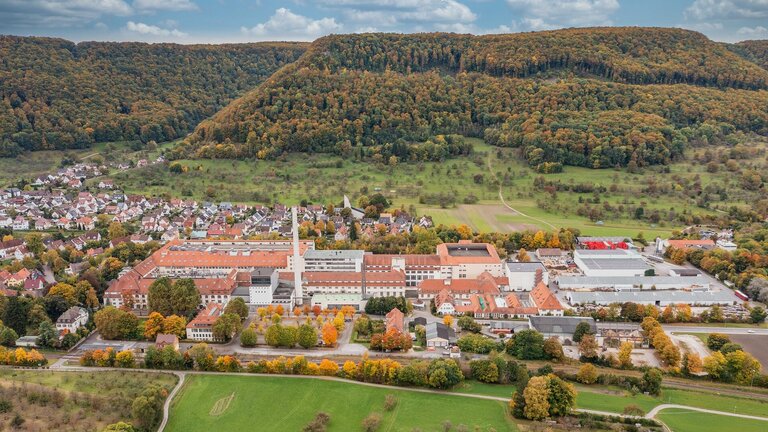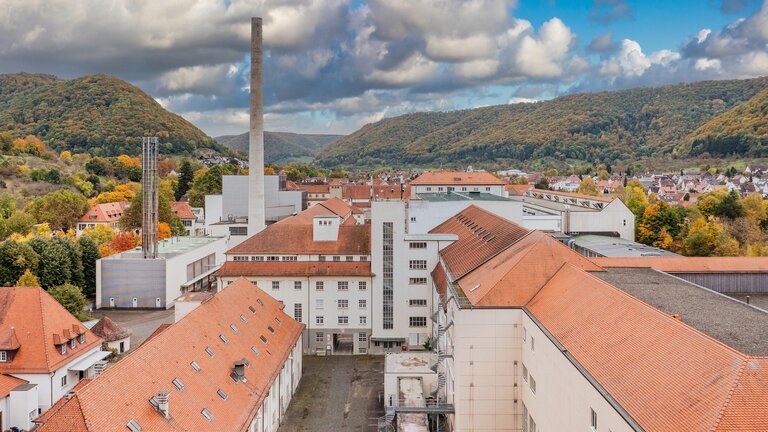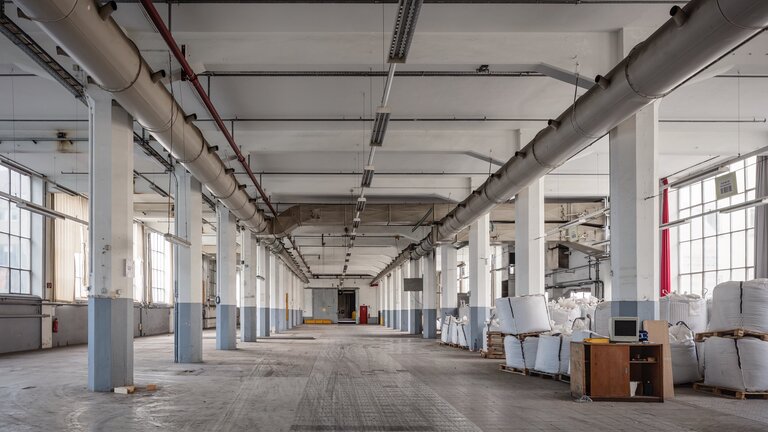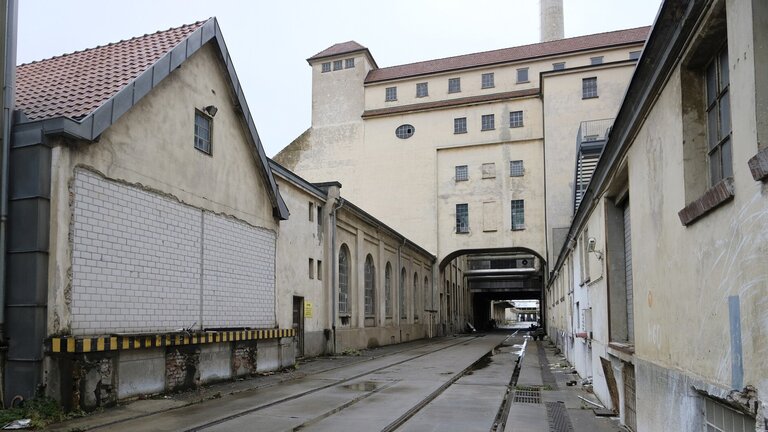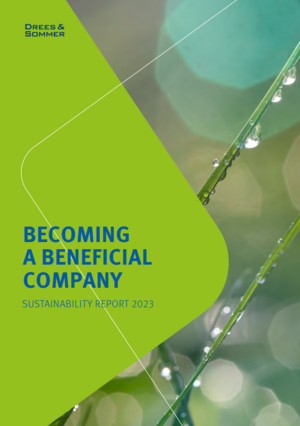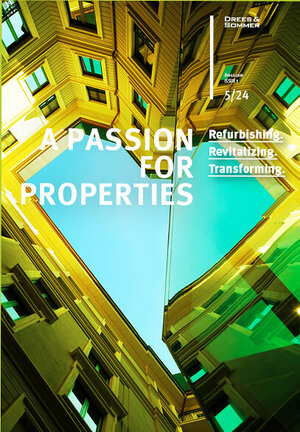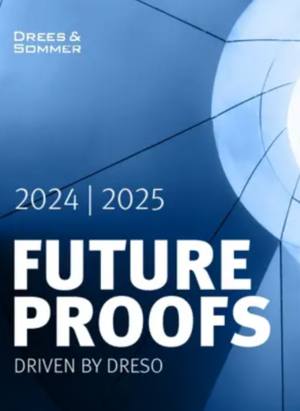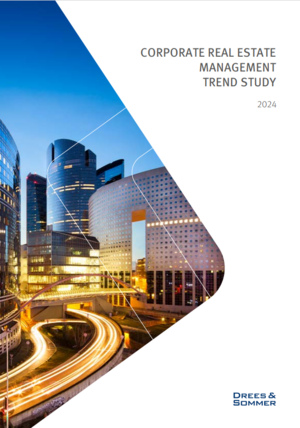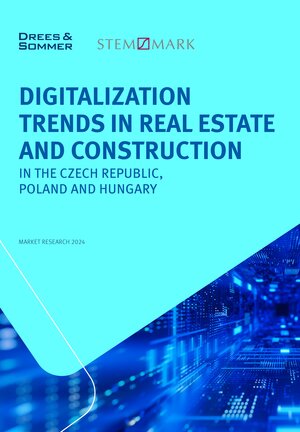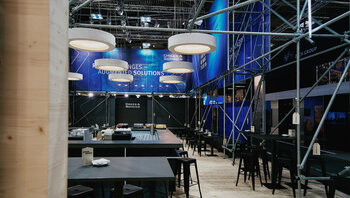On the 250,000-square meters site of the former Scheufelen paper factory in the Swabian municipality of Lenningen, high-quality paper was once manufactured and exported overseas. Now the Berlin property developer DLE Land Development GmbH plans to revitalize the industrial site, which has been vacant since 2018, and transform it into a mixed-use urban neighborhood with up to 650 residential units. Thirty factory buildings, some of which are protected listed structures, are to be renovated or replaced by new buildings. The construction and real estate consultancy Drees & Sommer SE, headquartered in Stuttgart, is managing the overall project. The detailed planning process is now starting, following the presentation of the project to the planning committee of the municipality of Lenningen at the end of January.
In Germany, 52 hectares per day of new land is currently being developed for settlements and transport infrastructure. However, the federal government wants to reduce land consumption to achieve ‘no net land take’ by 2050. This can only happen if vacant brownfield sites, including disused industrial area, are revitalized and repurposed. “The repurposing of the former Scheufelen factory will not only create a new, sustainable living and residential area for Lenningen, but also contribute to the rehabilitation and restoration of precious land to nature. In total, we plan to restore around 25 percent of the land to nature as part of the district development,“ commented Petra Müller, Director Conceptual Development and Communication at DLE.
The majority of around 30 existing buildings, which include former workshops and production spaces, will be dismantled. However, some of the buildings, such as the administration complex and the staff accommodation buildings, are protected listed structures and are to be retained and repurposed. Where compatible with the preservation orders, the developer also plans to uncover and restore the river Lauter, which currently runs under the site. The uncovering of the Lauter would create new blue and green spaces with leisure and recreation areas for the Scheufelen neighborhood.
A Sense of Community within the Neighborhood
The site, which is the area of more than 31 soccer pitches, offers a lot of room for creative district development. The current plans provide for several sub-areas with different uses such as residential, work and industrial. Up to 650 residential units could be built in the future Scheufelen district, which is named after the historic paper factory. For Lenningen’s Mayor Michael Schlecht another aspect is of key relevance: “The new district will have an important role in that it can link the two districts of Oberlenningen and Unterlenningen, which are currently separated by the industrial site.
The municipality and the region will both benefit in this way from this unique project, and we are keen for the plan to progress swiftly.”
Land Recycling as an Opportunity
In January this year, the urban development plan was presented to the planning committee of the municipality of Lenningen as well as to the district office of Esslingen. In the coming months, as soon the municipal council has passed its resolution regarding the preparation of a development plan, the project developer can set out further details of the plans. DLE uses the services of Stuttgart-based Drees & Sommer. Acting as project manager, the consulting firm monitors the schedule, feasibility and interfaces, and also coordinates the work of the executing firms and planners involved.
“There are many barriers to land recycling in Germany, and in general it is very expensive. Land regeneration is often impeded by bureaucratic hurdles and the lack of uniform standards, as well as constraints around protected structures. However, it does offer an opportunity to counteract the sealing of greenfield soils and just use what is already there. Brownfield developers are assuming great responsibility in this respect, and setting a good example,“ explains Max Vogel, who is responsible for the Scheufelen district project at Drees & Sommer. “With our experience of brownfield sites, we are particularly sought-after as a provider of support to developers and municipalities with plans to create new living spaces from old real estate,“ the project head adds.
Disused industrial sites, such as the Scheufelen area, cover more than 150,000 hectares across Germany. Since 2020, the newly founded German brownfield association, Deutscher Brownfield Verband (DEBV), has been committed to changing this situation and to improving the framework conditions for the revitalization and repurposing of brownfields.
For further details, please visit the website: Scheufelen District

